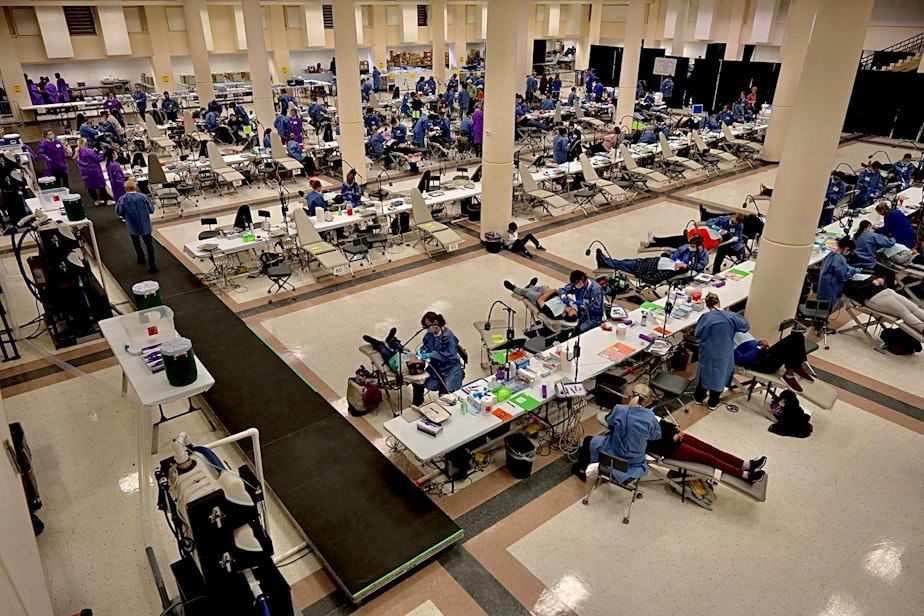Major toothache: A look inside dental care in Washington

When you break an arm or hit your head, you can go to an emergency room and someone will help you, even if you can’t pay.
But if you show up with a terrible toothache, the ER can’t really do much. They don’t have dentists on staff. The most they could do is give you some pain killers, or maybe pull the tooth, if it’s really bad. There’s no Obamacare for dental coverage.
So, when you need dental care, but don't have insurance, where can you go?
For years the Seattle King County Clinic provided free medical, vision and dental care for thousands of people. After taking a break in 2021, this year was supposed to be the grand return of the clinic. But after a scheduling mishap, it was canceled.
There will still be a vision clinic at the Seattle Center this year, but for people who need dental care, the cancelation was a big blow. Getting dental care when you're un- or underinsured can be challenging. You can't get care at an emergency room.
But why is that?
Marko Vujicic, chief economist and vice president of the Health Policy Institute at the American Dental Association, said the way dental insurance works doesn't mesh with traditional medical insurance, because it runs out at a certain dollar amount, instead of paying for a percentage of services.
"As an economist, you wouldn't classify it really as true insurance," Vujicic said.
Sponsored
All states are required to provide dental coverage to kids who are enrolled in Medicaid, Vujicic said. But that's not the case for adults.
"And so we kind of have this, this tapestry, where for children we do clearly consider it an essential service and part of core health care. It was listed as an essential benefit under the Affordable Care Act. It's mandatory within Medicaid programs," Vujicic said. "But magically, when you turn 19, our policy disconnects the mouth from the body."
And that separation causes a lot of issues—both for individuals and for the economy.
Because when you have problems with your teeth, you’re more likely to have health problems elsewhere.
"If you compare diabetics who have routine dental visits with those that don't, we see roughly about $800 per year in health-care cost savings," Vujicic said. "That's a very conservative estimate. Other studies have shown much, much larger fiscal savings."
Sponsored
So, if you don't have insurance, where can you go?
For some, the answer is a Federally Qualified Health Center, or FQHC. Such centers receive reimbursement for providing care to people in underserved areas. They also don’t turn anyone away for inability to pay.
One Washington based FQHC is the Yakima Valley Farm Workers Clinic, which is made up of 30 clinics in 18 locations.
Dr. Stephen Davis, the clinic's corporate dental officer, points out a lot of the same problems as Vujicic. Dentistry is still separated from the rest of the medical world. And he sees a difference in how dentists make money: generally, they’re paid per procedure.
"Medical was that way for some time," Davis said. "But we've seen a kind of a move away from that to more outcome based measures. And so now we understand in health care overall that we're looking for positive outcomes versus an actual procedure. But dentistry is still not quite to that point yet. From both a Medicaid standpoint, also from a private insurance standpoint, we still reimburse providers for the most part on what do they do for patients when it comes to procedures."
Sponsored
In other words, insurance companies pay based on how many cavities are filled or how many teeth are pulled. They don’t pay based on how few new cavities a patient has, or on someone being taught how to brush properly, or making sure they’re eating a diet that will help protect their teeth.
But if we really want to fix the dental system, both Vujicic and Davis agree that dentists can’t do it alone. It's going to take the work of the entire medical community to create a comprehensive care system.
"We both need dentists themselves to think about themselves as part of the health-care team, but also physicians to start thinking about the interaction between the oral cavity, which is the mouth, and overall health," Davis said. "It's going to require more than just one portion of the health-care team."
Correction: This story was updated on Friday, April 15, 2022 to amend the spelling of Dr. Stephen Davis's name.





